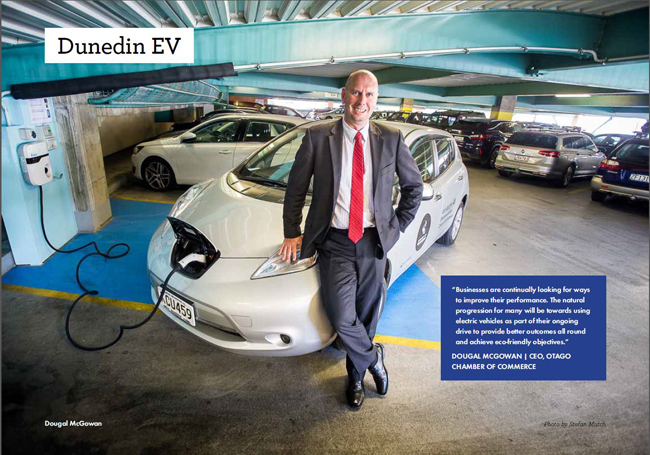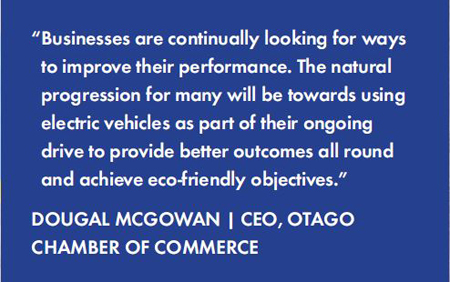

Current position
Transport in Dunedin is changing. Dunedin’s Integrated Transport Strategy is driving changes that impact on energy use, with millions of dollars being, or planned to be, spent on alternative transport options. Our community has also indicated a wish for the city to make the shift to energy efficient electric vehicles (EVs). The Energy Plan 1.0 provides a framework for supporting communities and organisations that have already started, or are interested in, shifting to EVs.
Progress is already being made. Local businesses are re-engineering conventional vehicles to run on electricity. Otago Polytechnic and the University of Otago are focal points for research on EV technologies and consumer preferences. A number of stakeholders, including the DCC, Otago Chamber of Commerce, Delta and Otago Polytechnic, have taken bold steps and installed the city’s first EV charging stations, including the South Island’s first fast charger.
The Dunedin Energy Baseline Study shows transport fuels are a major part of Dunedin’s energy consumption. EVs are a step towards saving energy dollars and improving our overall energy efficiency and economy.
Embracing EVs requires some infrastructure and logistical changes. The Dunedin EV action outlines activities that will facilitate these changes. The action also lends support to other alternative and communal forms of transport, such as those outlined in Dunedin’s Integrated Transport Strategy.
Action and delivery
Dunedin EV builds on a platform of already collaborating stakeholders and community groups.
Dunedin’s first EV charging stations are already installed and in use. Expanding this infrastructure across the city requires identifying other potential hosts: car parks, retail stores and other accessible public spaces. In the medium term, stakeholders will shed light on the advantages of hosting charging infrastructure and the potential for win-win collaborations between business, institutions and the research community.
Who should own and manage Dunedin’s charging infrastructure, and what payment methods are preferred by the city’s EV users? Dunedin EV will facilitate the discussions needed to answer these questions, and ideally create market opportunities in the transport sector.
It’s anticipated this action will support the switch to EVs in Dunedin. The city’s businesses and entrepreneurs may take an interest in improving access to EVs. Given the variety of possible user groups in the city, there is potential for different uptake patterns to emerge: corporate entities are taking steps to switch to an EV fleet; community groups and individuals are looking at options around leasing EVs and promoting the use of electric bikes; and the city’s public transport network is likely, over time, to include electric bikes and buses.
Measuring success
Successful delivery of this action will result in:
- more charging stations available at convenient locations throughout the city
- increased uptake of EVs for private and corporate drivers
- increased use of electric buses and bikes by the city’s commuters.
Key delivery partners
A number of organisations are already engaged in the discussion around electric vehicles in Dunedin, including:
- Aurora Energy
- Dunedin City Council
- New Zealand Automobile Association
- Otago Chamber of Commerce
- Otago Polytechnic
- University of Otago
- Dunedin City Council
- Otago Regional Council
| Confirmed activities | ||
| Delivery activities | Lead organisations | Measuring progress |
|---|---|---|
| Establish Dunedin’s first EV charging infrastructure |
|
|
| Work with the Otago Regional Council on potential EV transport activity |
|
|
| Proposed activities | ||
| Delivery activities | Lead organisations | Measuring progress |
|---|---|---|
Enable a group of energy leaders advise on:<
|
|
|
| Advocate for alternative and/or communal forms of transport such as electric buses |
|
|
| Establish links with potential charging station hosts and/or owners |
|
|
| Showcase local EV successes |
|
|
| Define key user groups and models for EV uptake |
|
|
| Highlight research on the latest developments in EVs and charging infrastructure |
|
|
Photo by Stefan Mutch
